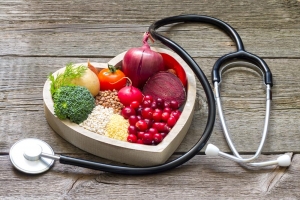How Long Does It Take To Reverse The Effects Of A Bad Diet?

Hunter Bennett
You know that eating a good diet is important.
But did you know that is one of the most important things you can do for your body, period?
Well, it is.
See, your diet can influence nearly every aspect of your health. It can impact your risk of developing heart disease and diabetes, your risk of depression and anxiety, and even alter the health and function of your brain.
Which begs the question – can you actually reverse the effects of a bad diet, or are you stuck with those negative effects for life?
What happens to your body on a bad diet?
What are the long-term effects of a poor diet?
Where do I even start…
First and foremost, if you eat a diet that is rich in highly processed carbohydrates, abundant in unhealthy fats, and overflowing in deep-fried junk foods, you start to see a number of key health issues. These include the accumulation of plaque on your arteries (termed atherosclerosis), weight gain, and an increase in chronic inflammation.
Secondly, if your diet doesn’t include any nutritious whole foods, it is going to be lacking in several essential vitamins and minerals. This can lead to immune system dysfunction, while simultaneously disrupting nearly every single one of your body’s physiological systems.
As a result, your unhealthy diet can lead to some pretty significant health problems.
What health problems are caused by bad diet
Taking all of this into consideration, the effects of unhealthy eating habits can be extremely profound. In fact, the diseases caused by poor diet include (Segal, 2015; Dash, 2016; Raju, 2017):
- Heart disease
- Diabetes
- Obesity
- Cancer
- Gastrointestinal disorders
- Parkinson’s disease
- Alzheimer’s
- Schizophrenia
- Depression
- Anxiety
To put it simply, poor diet effects nearly every disease known to man.
Related Article: Precision Nutrition and You: Nutrigenomic Approaches To Disease And Health
Can you reduce your risk of heart disease by eating healthy?
You will notice that when I was discussing the diseases caused by a bad diet, heart disease was sitting right at the top of the list.
This wasn’t an accident.
You see, heart disease is one of the biggest health burdens to plague modern day. Its incidence has been increasing at an exponential rate over the last few decades, and its impact can be devastating at both an individual and societal level.
And of course, it is also impacted by your diet in a very big way (Anand, 2015).
However, there is a growing body of research clearly demonstrating that you can actually prevent the onset of this ever-growing disease by choosing to eat better.
As I alluded to above, this appears to be best achieved by reducing your intake of highly processed carbohydrates, unhealthy fats, and junk foods, while increasing your intake of healthy fats, plant-based foods, and green leafy vegetables.
How long does it take for your body to detox from unhealthy eating?
There is a very common suggestion that eating a healthy diet has the ability to ‘detoxify’ your body – which is a bit of a loaded statement.
See, your liver does a very good job of removing chemicals and unwanted toxins from your body. In this manner, it is your primary source of detoxification.
As a result, a good diet won’t really help you detox per se – however, it will certainly help you reverse the negative effects that come with eating a bad diet. As such, a good quality diet can do the following:
- Improve insulin sensitivity
- Lower blood sugar levels
- Reduce blood pressure
- Normalize blood cholesterol
Now, how long it takes to see these effects is going to be very individual, and heavily dependant on how unhealthy you currently are. If you have been eating a poor diet for years, then this process is going to take much longer than if you had only been eating poorly for months.
Although I should note that research has shown dietary interventions can cause changes in these measures in as little as 8 weeks – which is pretty good news if you ask me!
Diet and atherosclerosis
One of the largest drivers for heart disease and cardiovascular dysfunction is an issue known as atherosclerosis, which I mentioned very briefly above (Rafieian-Kopaei, 2014).
Atherosclerosis describes the accumulation of plaque on the walls of your arteries, which causes them to narrow. This makes it more challenging for blood to be moved about the body, increasing the stress placed on your heart and remainder of your cardiovascular system.
Now, it is also important to note that atherosclerosis is generally caused by high blood cholesterol. It is these pockets of fat that accumulate on your arterial walls, gradually turning into plaque.
Positively, there is a growing body of evidence to suggest that opting for a plant-based diet that is low in refined carbohydrates can improve cholesterol levels significantly, which can go a very long way to preventing atherosclerosis (Gjuladin-Hellon, 2019).
But can you actually cause it to regress?
Is the regression of atherosclerosis possible?
This is where things get pretty darn interesting.
While atherosclerosis was considered to be a completely irreversible adaptation, recent research has indicated that this may not be the case at all.
In fact, there is evidence to suggest that through the integration of plant-based diets, the restriction of processed carbohydrates and unhealthy fats, and the addition of exercise, atherosclerosis can actually be reversed fairly significantly (Tuso, 2013).
The thing that needs to be acknowledged here is that this is not necessarily a quick fix. It may take up to 12 months before any long terms changes in the severity of your atherosclerosis is observed in any capacity.
Which pretty simply means that keeping yourself healthy is about lifelong lifestyle changes!
Best tips for preventing atherosclerosis
I have already alluded to some of the steps you need to take to both prevent and regress atherosclerosis, however, I truly believe that this needs to be discussed in further detail.
Plant-Based Diets
When it comes to the type of specific diet, plant-based diets appear to have the most merit when it comes to preventing atherosclerosis (Tuso, 2015).
These diets are rich in fiber, are known to lower blood cholesterol, and contain an abundance of anti-inflammatory properties. As a result, they are arguably one of the most well-regarded treatments for atherosclerosis.
Additionally, as plant-based diets are notoriously low in sugar, fat, and salt, they also prevent the formation of harmful cholesterol in the blood, which further prevents it onset.
How does exercise play a role?
In conjunction with diet, exercise has been shown to play an increasingly important role in the prevention and treatment of atherosclerosis.
See, exercise firstly improves the function of your veins and arteries, which alone has been shown to reduce the risk of plaque formation. Secondly, it has been shown to cause significant reductions in the levels of bad cholesterol in the blood – which again, has serious benefits (Al-Mamari, 2009)
With this in mind, it appears that aerobic exercise may have a better effect on heart health and atherosclerosis than weight training, so this should be your first point of call.
In this manner, aiming for at least 150 minutes of moderate intensity aerobic exercise per week is the perfect starting point.
Can you out-exercise a bad diet?
Lastly, I should note that while exercise is indeed important, it appears to play a somewhat secondary role to diet.
Research has shown that if you implement an exercise routine in people with significant atherosclerosis without changing other lifestyle factors such as diet, they will get fitter – but they won’t see any real change in their cardiovascular health (Rauramaa, 2004).
Which ultimately suggests that while exercise is indeed incredibly important, it won’t compensate for a bad diet.
Related Article: Gene-Based Nutrition: Can It Benefit You?
How can I start and stay eating healthy?
So how to start eating healthy?
In my mind, it comes down to making some key dietary changes and sticking to them with religious fervor. Try and build your diet around the following foods:
- Vegetables
- Fruits
- Whole grains
- Nuts
- Seeds
Within this, if you don’t want to go full plant-based, the following foods are also perfectly good options:
- Seafood
- Lean cuts of meat
- Poultry
Additionally, you want to avoid the following foods like the plague:
Now, while this list of foods is all well and good, you might also be wondering how to stay eating healthy? And this is where things get a little bit tricky – not because it is hard per se, but it does require a lot of hard work and dedication.
My best advice revolves around making sure your home is full to the brim with good foods while containing none the bad ones. This obviously makes it much easier to stay on track when you are at home.
I would also encourage you to do a bit of research and find those healthier restaurants in your area. This means that every time you go out for dinner (even if it’s on a whim), you have a great option ready to go that fits your needs.
Lastly, be diligent, and be aware that you will fall off the wagon sometimes – just remember that one bad meal doesn’t matter as long as you get back on track straight away!
Take Home Message
A bad diet is one of the biggest drivers for disease and illness in the modern day – but it certainly doesn’t have to be a death sentence.
By making some smart dietary changes and integrating a sound exercise routine into your life you can improve your health and prevent a myriad of issues. More importantly, this can also help you reverse the negative effects of your bad diet. It’s pretty incredible to think about really!
References
Segal, Leonie, and Rachelle Sara Opie. “A nutrition strategy to reduce the burden of diet-related disease. Access to dietician services must complement population health approaches.” Frontiers in pharmacology 6 (2015): 160.
Dash, Sarah R., Adrienne O’Neil, and Felice N. Jacka. “Diet and common mental disorders: the imperative to translate evidence into action.” Frontiers in public health 4 (2016): 81.
Raju, M. “Medical nutrition in mental health and disorders.” Indian journal of Psychiatry 59.2 (2017): 143.
Anand, Sonia S., et al. “Food consumption and its impact on cardiovascular disease: the importance of solutions focused on the globalized food system. A report from the workshop convened by the World Heart Federation.” Journal of the American College of Cardiology 66.14 (2015): 1590-1614.
Rafieian-Kopaei, Mahmoud, et al. “Atherosclerosis: process, indicators, risk factors and new hopes.” International journal of preventive medicine 5.8 (2014): 927.
Gjuladin-Hellon, Teuta, et al. “Effects of carbohydrate-restricted diets on low-density lipoprotein cholesterol levels in overweight and obese adults. a systematic review and meta-analysis.” Nutrition reviews 77.3 (2019): 161-180.
Tuso, Philip J., et al. “Nutritional update for physicians: plant-based diets.” The Permanente Journal 17.2 (2013): 61.
Tuso, Phillip, Scott R. Stoll, and William W. Li. “A plant-based diet, atherogenesis, and coronary artery disease prevention.” The Permanente Journal 19.1 (2015): 62.
Al-Mamari, Ali. “Atherosclerosis and physical activity.” Oman medical journal 24.3 (2009): 173.
Rauramaa, Rainer, et al. “Effects of aerobic physical exercise on inflammation and atherosclerosis in men: the DNASCO Study: a six-year randomized, controlled trial.” Annals of internal medicine 140.12 (2004): 1007-1014.
You Might Like:
















